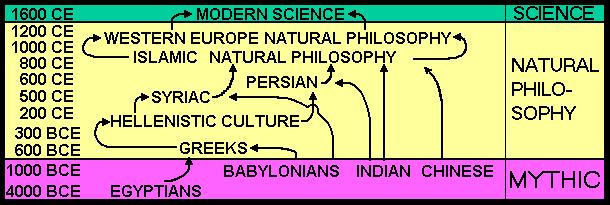| |
 |
|
 |
 |
|
| |
 |
|
 |
 |
|
|
Science is one of mankind's greater achievements. Born in the Renaissance, modern science quickly established itself as a powerful new way of looking at the world. One definition is that science is an accepted body of systematic descriptions and explanations about the natural world. There are many other definitions, perhaps as many slightly different ones as there are scientists or disciplines. Nevertheless, while there is variation within disciplines and individuals, some basic points are generally valid for all who do science.  Perhaps the most fundamental shift necessary for the emergence of science is the way people see themselves in relation to the physical world (nature). Originally humanity lived by gathering and hunting. While we only have hints of the way in which our remote ancestors perceived themselves and the world, we can see that in those cultures of that type that survive today, people always see themselves imbedded within the systems of nature. Nature, the places, plants, animals and the people themselves are all part of the same spiritual whole, which man can contact and influence by ritual and magic. In this world, man survives by killing, by taking life from, and sharing it with other life. It is a world perceived as mystery, and described in myth. Without doubt, our ancestors viewed themselves in much the same way. Myth has many functions. To quote Joseph Campbell from the Historical Atlas of World Mythology pp. 8-9:
Then, some 10,000 years ago, a segment of mankind turned to agriculture. With this new way of life, came a new way of looking at the world, a new set of gods. With the realization of the regularity of seasons and the growth of the concept that it is human labor that brings forth the fruits of the earth, man becomes more than just one of the players, he assumes a central role. He now has dominion over the earth. No longer totally shrouded in mystery, nature becomes something that can be controlled and exploited. If rain is insufficient, certainly we pray, but we also irrigate. Thus, over the following millennia there evolved the concept of a regular, usually orderly nature that follows the general pattern set up by the god(s). While the course of events might occasionally be subject to divine intervention, such interactions are rare and nature generally follows its usual , pre-ordained course. Given then that there is natural order and harmony, the regularity in nature is open to human thought. The built-in patterns can be understood by thinking about them, by applying logic to them. With time, there evolved in Ionian Greece, and separately in other societies, a point of view which today we call natural philosophy, that searches for and explains nature in terms of ideals and ideas. The most recent step in this series of ways of looking at the world was taken during the Late Renaissance. It involved neither divine mystery nor the supremacy of human intellect and thought. The autonomous regular course of nature is no longer mystical, it is no longer bounded by divine will or human logic. Nature simply is. What man can decipher is how nature behaves and to describe and explain it, and he can only do so by removing and detaching himself from it. Those are the attitudes and concepts at the root of modern science. (Comparison between the three steps) |